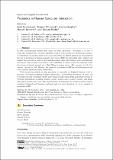Proxemics in human-computer interaction (Dagstuhl Seminar 13452)
Abstract
In 1966, anthropologist Edward Hall coined the term "proxemics." Proxemics is an area of study that identifies the culturally dependent ways in which people use interpersonal distance to understand and mediate their interactions with others. Recent research has demonstrated the use of proxemics in human-computer interaction (HCI) for supporting users' explicit and implicit interactions in a range of uses, including remote office collaboration, home entertainment, and games. One promise of proxemics is the realization of context-aware environments, which have been extensively pursued since Marc Weiser's seminal paper, "The computer for the 21st century," written in 1991. However, the potential of proxemics in HCI is still underexplored and many research questions remain unanswered. With the growing interest in using proxemics, we organized the Dagstuhl Seminar 13452 on the topic. "Proxemics in Human-Computer Interaction," was held from November 3-8, 2013, and it brought together established experts and young researchers from fields particularly relevant to Proxemic Interactions, including computer science, social science, cognitive science, and design. Through an open keynote, mini talks, brainstorming, and discussion in breakout sessions, seminar attendees identified and discussed challenges and developed directions for future research of proxemics in HCI.
Citation
Greenberg , S , Hornbaek , K , Quigley , A J , Reiterer , H & Radle , R 2014 , ' Proxemics in human-computer interaction (Dagstuhl Seminar 13452) ' , Dagstuhl Reports , vol. 3 , no. 11 , pp. 29 - 57 . https://doi.org/10.4230/DagRep.3.11.29
Publication
Dagstuhl Reports
Status
Peer reviewed
ISSN
2192-5283Type
Journal article
Collections
Items in the St Andrews Research Repository are protected by copyright, with all rights reserved, unless otherwise indicated.

